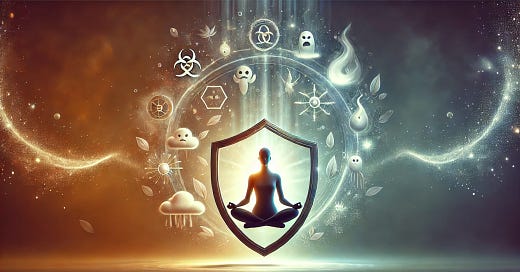Dealing with Toxic People: Protecting Your Peace and Well-Being
Understanding toxic relationships and learning strategies to protect your well-being using Stoic philosophy. Explore practical techniques for managing negativity and setting boundaries.
Have you ever had a friend who gradually became a source of stress rather than support? I remember one such friend—let’s call him John. John and I met in high school, and we bonded over our shared interest in gaming and had countless late-night conversations. For years, I considered him my best friend. But over time, I noticed changes. Our talks shifted from mutual encouragement to him constantly venting negativity. He began to belittle my achievements, started making jokes at my expense, and showed a lack of respect for my time by frequently arriving late or canceling plans last minute. It felt like everything I valued in our friendship was slowly slipping away.
One evening, after sharing news about a promotion I was excited about, John responded with sarcasm and insinuated that I didn't deserve it. I felt disturbed and confused. This wasn't the friend I once knew. I realized that his negativity was affecting my inner peace and happiness. I tried talking with John several times about this, but he never seemed to listen or take me seriously. He brushed off my concerns as if they were insignificant, and I found myself growing more and more frustrated.
It was a difficult decision, but I knew I had to distance myself to protect my well-being.
After distancing myself from John, I found myself with a surprising amount of energy and focus that I hadn’t realized I’d been missing. The constant cycle of negativity and emotional drain had been taking up a huge amount of my mental space. Without it, I could redirect that energy toward more positive relationships and pursuits that brought me joy.
Toxic people have a way of subtly, but significantly, stealing our time and energy. They dominate our thoughts, color our moods, and ultimately take up space that could be used for things that enrich our lives. When you remove them, you create room for growth, happiness, and authentic connections.
Have you dealt with a toxic relationship? Share your story in the comments.
"Other people's views and troubles can be contagious. Don't sabotage yourself by unwittingly adopting negative, unproductive attitudes through your associations with others." — Epictetus
Understanding the Toxic Dynamic
Toxic relationships are those that poison our peace and happiness. They can occur in any area of life—work, friendships, family, or romantic partnerships. A toxic person might be someone who consistently drains your energy, manipulates your emotions, or undermines your self-esteem.
Signs You Might Be in a Toxic Relationship:
Constant Criticism: Frequent belittling or demeaning comments.
Emotional Manipulation: Using guilt or coercion to control your actions.
Lack of Support: Dismissing your achievements or discouraging your goals.
Chronic Negativity: Focusing on the bad in every situation.
Research published in the Journal of Social and Personal Relationships indicates that exposure to toxic relationships can lead to increased stress, decreased immune function, and even cardiovascular issues. Recognizing these signs is the first step toward safeguarding your well-being.
The Hidden Costs of Negative Relationships
Allowing toxic individuals to influence us can have strong effects on our mental and physical health. According to a study in Psychology Today, chronic exposure to negative relationships can lead to anxiety, depression, and decreased life satisfaction.
Impacts on Well-Being:
Emotional Turmoil: Increased feelings of sadness, anger, or hopelessness.
Reduced Self-Esteem: Beginning to believe negative comments about oneself.
Physical Symptoms: Headaches, fatigue, or other stress-related ailments.
Understanding these consequences emphasizes the importance of addressing toxic relationships proactively.
Embracing Stoic Wisdom to Handle Toxicity
Stoicism offers insights into managing difficult people and toxic relationships. The philosophy emphasizes focusing on what we can control—our own thoughts, emotions, and reactions—while accepting that we cannot change others or external events. This approach empowers us to maintain inner peace.
Marcus Aurelius reminds us:
"Choose not to be harmed—and you won't feel harmed. Don't feel harmed—and you haven't been."
This quote highlights that much of the distress we experience comes from our perception. By choosing not to internalize negative actions or words, we shield ourselves from their impact.
Applying Stoic Principles in Toxic Situations:
Recognize Your Control: Understand that while you can't dictate others' behavior, you have full control over your response. This awareness is liberating and places the power back in your hands.
Set Healthy Boundaries: Stoicism doesn't mean enduring negativity without action. It encourages setting clear boundaries to protect your well-being. Communicate your limits calmly and assertively.
Practice Emotional Detachment: View the toxic person's behavior as a reflection of their own struggles, not a commentary on your worth. This detachment reduces the emotional charge of the situation.
Cultivate Inner Virtue: Focus on developing qualities like patience, courage, and wisdom. Adversity becomes an opportunity for personal growth rather than just an obstacle.
Epictetus wrote:
"It's not what happens to you, but how you react to it that matters."
By internalizing this wisdom, we can navigate toxic relationships without allowing them to disrupt our inner tranquility. We become resilient, responding thoughtfully instead of reacting impulsively.
Knowing When to Walk Away
While it's noble to try and manage toxic relationships, there comes a point when staying does more harm than good. Recognizing when to distance yourself is crucial for your well-being.
Signs It's Time to Step Back:
Ignored Boundaries: You've set limits, but they're consistently disregarded.
Emotional Exhaustion: You feel drained after every interaction.
No Positive Change: Despite discussions, the negative behavior continues.
Interference with Life: The relationship affects your work, health, or other relationships.
How to Distance Yourself:
Trust Your Feelings: If something feels off, don't dismiss it. Your emotions are valid indicators.
Limit Contact: Reduce interactions to protect your mental and emotional health.
Seek Support: Lean on friends and family who can offer guidance.
Focus on You: Engage in activities that make you happy and reinforce your self-worth.
Letting go isn't easy, but sometimes it's the healthiest choice. Remember, you deserve relationships that uplift and support you.
📝 Today’s Stoic Gameplan:
Set Your Focus: Begin your day by affirming, "I will not allow others' negativity to disturb my peace."
Practice Detachment: If confronted with negativity, visualize a protective barrier around you that repels negative energy.
Journal Your Thoughts: Write about any challenging interactions and how you responded. What did you learn?
Identify One Boundary to Set: Choose a small, manageable boundary to implement with a toxic person in your life.
Dealing with toxic people is never easy, but by applying Stoic principles, we can navigate these relationships without sacrificing our well-being. Remember that your peace of mind is paramount, and you have the power to protect it.
Stay stoic,
StoicWisdoms
Twitter: @StoicWisdoms
Related posts:
When Life Gives You an Opportunity, You Seize It and Make It Count
Life Does Not Always Go Our Way
Never Be Taken for Granted Again: Tips for Gaining Respect and Appreciation









Very true
The secret is to move on..
Enjoyed the good times and moments and while we may cherish them too, we no more continue like old times. It is done and dusted.
Move on to more promising relationships which is a certainty.
The length of a friendship doesn't give someone a "free pass" to negatively affect a relationship. Don't hold onto it because it's always been these. I recently had to accept that even a long friendship - 25 years - had an expiry.